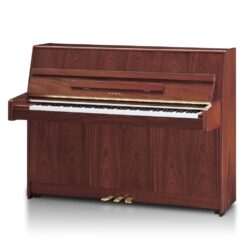C. Bechstein Millennium 116 K Upright Piano
CAD 49,315.07
-
The 116 K Millennium is the very definition of “good things come in small packages”. With the most precise design – straight from Bechstein’s famed Berlin R&D team – the 116k delivers an astounding sustain, complexity of tone, and exhilarating clarity in a manageably-sized cabinet.
Description
Product Overview
The C. Bechstein Millenium 116 K is a perfect option for those seeking the absolute top in German hand-craftsmanship, in as small a cabinet as possible. Internally, it boasts all of the exclusive quality features of the Masterpiece class, such as Val Di Fieme Spruce (same wood source as the Stradivarius violins), Dark Walnut Double-felted Hammers, and Pure Copper Hand-wound Bass Strings.
Externally, this piano has won three prestigious international design awards: the Good Design Award, the IF Product Design Award, and the IF Gold Design Award. In each case, the jury considered such criteria as form, material, design, usability, aesthetics, functionality, creativity, originality, and innovation.
With a production time of over 8 months and 180 work hours, the C. Bechstein Millenium 116 K is a world-class instrument both inside and out that sounds like a much larger piano, built to serve discerning pianists and as the centerpiece for all types of interior designs.
Action
If you’re looking for a piano with the best action that C. Bechstein offers, the “Gold Action” in the 116k that’s reserved for Masterpiece pianos is the way to go. This actions designation shows that it gets the highest regulation and voicing levels offered, as well as the most precise components and hammers. The extreme tolerances are a result of the hours and hours of factory refinement put into the actions, which results in an almost perfect product right out of the box.
The particular mix of friction and weight coefficients is referred to by Bechstein as the Friction Control System. There must be something to this; the Gold Action in the 116 K is perfectly balanced and incredibly fluid, remarkably so for a 45” upright piano.
Tone
A 45” upright piano must be inherently bright and shrill, right? Wrong, this is definitely not the case with the 116 K. Instead, this is an instrument with a warm, powerful, and colourful European tone, capable of a wide range of dynamic subtleties. The 116 K produces way more sound than many much larger upright pianos, with its full cabinet activation creating the “bloom” quality the Bechstein is famous for. One of the main reasons for this is the use of CNC technology along with German Red Beech. By using CNC machining, precision within a hundredth of a millimeter can be attained. As a result of this precision, the ideal transmission of frequencies and sound to the soundboard is achieved.
Building on the quality of the materials and precision of the components, the use of agraffes to anchor, stabilize and position the strings so that they are optimally struck by the hammers, also contributes to the complex tone and unique timbre of the 116 K. This provides strength to the fundamental tone, as well as greater tonal clarity.
Hammers
With a desire to control every aspect of their manufacturing process, Bechstein not only produces their own hammerheads, but tailors these to each specific instrument in their lineup. The dark walnut core of the hammer is covered using a traditional, top-secret proprietary process. The wool that is used is from New Zealand, and expert technicians hand-voice each hammer prior to the piano leaving the factory. This results in a broader range of dynamics and a greater spectrum of tonal colours. All of this is accomplished in Bechstein’s German production facility; something that is out of the norm in today’s global economy.
Soundboard
When it comes to the design of the 116k, the Val Di’ Fiemme Italian Red Spruce used for the soundboard is only part of the reason for this model’s “bloom-like” tonal nature. This wood comes from the same source as the one Stradivarius used to make his violins, and only the Masterpiece upright pianos use this in their manufacture.
Apart from the quality of the wood itself, the soundboard is designed with a taper whose membrane-like projection surface is tailored to each piano’s acoustic assembly. Thanks to this approach, you have a soundboard that is sensitive to even the smallest of vibrations, but suffers no energy loss and provides the greatest resonance.
Cabinet
By activating the entire body of the piano, which includes both the cabinet and the frame, the loss of energy is greatly minimized. To accomplish this, Bechstein’s design uses a highly stable, triple jointed, precision fit mix of long aged hardwood, which also helps to ensure the elimination of biasing.
Structural stability is key to minimizing distortion, reinforcing the sound, and guaranteeing an in-tune piano. This is done by using copper Beech dowels to secure solid back posts at the joints, and by utilizing a sand-cast iron frame that can withstand fifteen metric tonnes of tension. Combined, these materials and assembly methods help create a full bass and warm mid-register as well as allow for easy production and modulation of upper treble range partials.
Specs
| Size | Height | 45.7” (116 cm) |
| Width | 59.1” (150 cm) | |
| Depth | 22.8" (58 cm) | |
| Weight | 514 lbs. (233 kg) | |
| Finishes | Polished Ebony Polished White |
|
| Warranty | 5 Year Parts & Labour Manufacturer’s Warranty |
Reviews (0)
Be the first to review “C. Bechstein Millennium 116 K Upright Piano” Cancel reply
You must be logged in to post a review.
You may also like…
Upright Pianos
Upright Pianos
Upright Pianos
Related products
Upright Pianos
Schimmel Upright Pianos
Pearl River Upright Pianos
Schimmel Upright Pianos
Upright Pianos
All Piano Brands
Schimmel Upright Pianos
Schimmel Upright Pianos
Kawai Hybrid
Upright Pianos
Upright Pianos
Upright Pianos

















Reviews
There are no reviews yet.